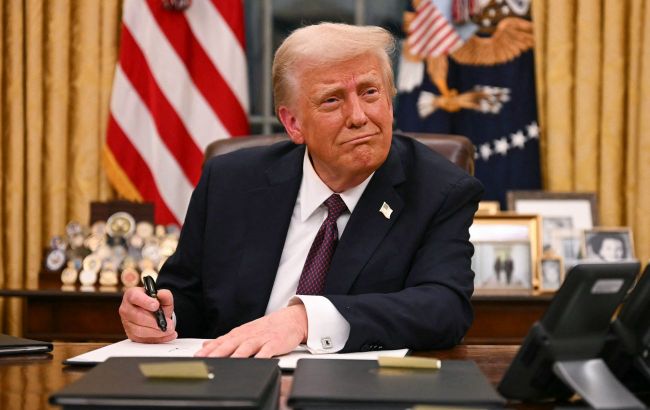Trump imposes unprecedented global tariffs
 Donald Trump, President of the US (photo: Getty Images)
Donald Trump, President of the US (photo: Getty Images)
US President Donald Trump has announced the introduction of extensive tariffs on American imports, which are expected to impact trade volumes worth trillions of dollars, according to Trump's statement.
Speaking in the Rose Garden near the White House, US President Donald Trump teased what he called very, very good news.
"I will sign a historic executive order instituting reciprocal tariffs on countries throughout the world. Reciprocal, that means, they do it to us, and we do it to them. Very simple. Can't get any simpler than that," Trump said.
Trump criticized Thailand, India, Vietnam, and other countries for what he called unfair tariff policies and tax regimes targeting American goods. He cited examples, noting that while the US imposes only a 2.4% tariff on motorcycles, India charges 70% and Vietnam 75%.
Before signing the order, he spent considerable time detailing what he described as unfair tariffs imposed on American products.Trump said that sometimes friends were worse than enemies, referring to the high tariffs levied by some US allies, such as Japan.
“This is one of the most important days, in my opinion, in American history. It's our declaration of economic independence,” Trump declared.
He explained how the US would determine the scope of the reciprocal tariffs, saying, “For nations that treat us badly, we will calculate the combined rate of all their tariffs, non-monetary barriers and other forms of cheating.”
Trump also reiterated that, starting at midnight on April 3, the US would impose a 25% tariff on all foreign-assembled cars. Additionally, he announced the introduction of a universal or minimum base tariff of 10% on imports.
Amount of tariffs on the main trading partners of the US
According to the executive order, the US will impose additional tariffs as follows:
- China – 34%;
- European Union – 20%;
- Vietnam – 46%;
- Taiwan – 32%;
- Japan – 24%;
- South Korea – 25%;
- Thailand – 36%;
- Switzerland – 31%;
- Indonesia – 32%;
- Malaysia – 24%;
- Cambodia – 49%;
- UK – 10%;
- South Africa – 30%;
- Brazil – 10%;
- Bangladesh – 34%;
- Singapore – 10%;
- Israel – 17%;
- Philippines – 17%;
- Chile – 10%;
- Pakistan – 29%;
- Sri Lanka – 44%
The reciprocal tariffs will take effect on April 9, 2025, while the minimum base tariff will be applied starting April 5.
The 10% base tariff will be added on top of country-specific tariffs. This means Chinese goods will face a total tariff of 44% (34% + 10%), while imports from the EU will be subject to a 30% tariff (20% + 10%).
How the new tariffs were prepared
Previously, Trump and his administration had identified the European Union, Mexico, Canada, Japan, South Korea, Vietnam, and India as potential targets for future tariffs to punish unfair trade practices.
According to Bloomberg, global trade worth $33 trillion is now under scrutiny, with exports to the US from countries ranging from Brazil to China at risk of shrinking by 4% to 90%. Average tariffs are expected to rise by 15%, which could drive inflation higher and increase the risk of a US recession.
The measures announced today build on steps taken since Trump took office in January. His administration has already imposed a 20% additional tax on all imports from China and a 25% tariff on many goods from Mexico and Canada. A global 25% tariff on steel and aluminum remains in effect, and an order imposing a 25% tariff on imported cars and certain auto parts is set to take effect on April 3.
What the consequences might be
According to Bloomberg, under the most aggressive approach, average US tariff rates could rise to 2%, leading to a 4% contraction in the US. GDP and a nearly 2.5% increase in prices over the next two to three years.
The impact on trade partners will be significant under any scenario. China, the EU, and India are expected to be among the hardest hit by export losses to the US, though their economies may withstand the pressure. Canada and Southeast Asian nations are likely to experience a more substantial overall impact.
Earlier reports indicated that the European Commission could respond by closing the EU market to American goods.
European Commission President Ursula von der Leyen has stated that the bloc has a decisive plan but prefers to seek a solution through negotiations. However, if talks fail, Brussels is prepared to defend the interests of European businesses and consumers.
Canadian Prime Minister Mark Carney has also warned of possible retaliatory measures against the US.

